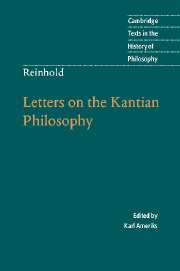Book contents
- Frontmatter
- Contents
- Preface
- Introduction
- Chronology
- Further reading
- Note on the texts and translation
- Letters on the Kantian Philosophy
- First Letter: The need for a Critique of Reason
- Second Letter: The result of the Kantian philosophy on the question of God's existence
- Third Letter: The result of the Critique of Reason concerning the necessary connection between morality and religion
- Fourth Letter: On the elements and the previous course of conviction in the basic truths of religion
- Fifth Letter: The result of the Critique of Reason concerning the future life
- Sixth Letter: Continuation of the preceding letter: The united interests of religion and morality in the clearing away of the metaphysical ground for cognition of a future life
- Seventh Letter: A sketch of a history of reason's psychological concept of a simple thinking substance
- Eighth Letter: Continuation of the preceding letter: The master key to the rational psychology of the Greeks
- Appendix: the major additions in the 1790 edition
- Index
- Cambridge texts in the history of philosophy
Fifth Letter: The result of the Critique of Reason concerning the future life
Published online by Cambridge University Press: 05 June 2012
- Frontmatter
- Contents
- Preface
- Introduction
- Chronology
- Further reading
- Note on the texts and translation
- Letters on the Kantian Philosophy
- First Letter: The need for a Critique of Reason
- Second Letter: The result of the Kantian philosophy on the question of God's existence
- Third Letter: The result of the Critique of Reason concerning the necessary connection between morality and religion
- Fourth Letter: On the elements and the previous course of conviction in the basic truths of religion
- Fifth Letter: The result of the Critique of Reason concerning the future life
- Sixth Letter: Continuation of the preceding letter: The united interests of religion and morality in the clearing away of the metaphysical ground for cognition of a future life
- Seventh Letter: A sketch of a history of reason's psychological concept of a simple thinking substance
- Eighth Letter: Continuation of the preceding letter: The master key to the rational psychology of the Greeks
- Appendix: the major additions in the 1790 edition
- Index
- Cambridge texts in the history of philosophy
Summary
As I mentioned in my last letter, the Critique of Reason has discovered and forever established the highest basic principle of all philosophy of religion in that postulate of practical reason which makes necessary both the expectation of a future world and the presupposition of a highest principle of moral and natural laws. I believe that I have so far shown you, dear friend, “that the recognition of that highest basic principle – in so far as it determines the sole secure ground for cognition of the existence and properties of the deity – must be brought about by the course that, in accordance with its nature, the human spirit must take with regard to religious conviction,” and “that the reconciliation and unification of religion and morality, on which more depends at present than ever before, completely hinges on this recognition.” Both claims must be able to be shown from one and the same highest basic principle [168] in so far as it also contains the sole secure ground for cognition of a future life. Reason's two articles of faith are so intimately tied up with one another, so perfectly of one nature, and have experienced such very similar fates, that almost everything that I have asserted until now regarding the one can be applied to the other. There thus remains little left for me to do at present than to lighten the small task of this application by means of a few suggestions.
- Type
- Chapter
- Information
- Reinhold: Letters on the Kantian Philosophy , pp. 65 - 75Publisher: Cambridge University PressPrint publication year: 2006



